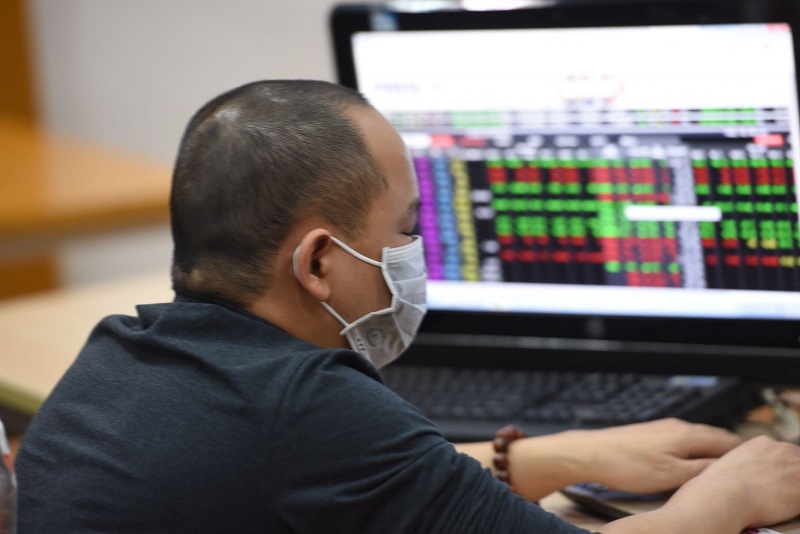Foreign investors' net-selling pressure has not stopped
According to Mr. Bui Hoang Minh, Head of Analysis at HSC Securities, although the interest rate differential between Vietnam and other countries has narrowed, there is still a significant gap, especially as the pressure for foreign investors to take profit in the Vietnamese stock market has not yet ended.
The Vietnamese stock market resumed its strong uptrend in the first two weeks of the new year, aided by the bank stocks following a year of sluggish accumulation. Furthermore, good business outcomes imply that the threats to the overall Vietnamese economy appear to have receded in 2023.

Divergence of Foreign Capital Flows
Mr. Bui Hoang Minh observes that the global focus remains on big economies such as the United States, Europe, and Japan, where foreign capital continues to flow, propelling these nations' stock markets to new heights.
In the United States, recent figures indicate inflation somewhat higher than expected but not much higher, consistent with the overall trend of fast cooling toward the Federal Reserve's long-term objective of 2%. Notably, interest rates on 10-year and 30-year US government bonds have fallen below 4%, yet foreign capital continues to come into the bond market in search of larger average returns than before.
The US market is healthy due to the economy's general strength, with continued consumer spending and increases in AI engagement in corporate operations, increasing American firms' competitiveness. Furthermore, a stable work market in the United States is essential for Americans to build wealth.
Since the beginning of the year, the US stock market has showed significant growth, with the S&P 500 index reaching its top amid low interest rates, AI development, strong consumer motivation, and so on. As a result, the top industries from 2023 will continue to lead in 2024.
In Asia, the distinction in foreign capital investment has grown much obvious, particularly in light of China's larger-than-expected economic slump, which is linked to a fall in import-export operations. However, this reduction is from the historical peak of 2021-2022, and it remains significantly higher than in past years.
One factor for China's continued high export value is a considerable move toward more intellectual and technology content in their products. China has been a pioneer in investing in and selling electric vehicles during the last 2-3 years, establishing itself as a strong competitor to the United States.
Japan has become Asia's greatest capital magnet, hitting a historical high after 34 years. This coincided with historic profit-taking pressure as investors pulled money out of the Chinese stock market and into other Asian countries, particularly Japan.
This also puts a strain on neighboring nations like as Vietnam, who have suffered severe profit-taking pressure from international investors in 2023. Investors might thus imagine a situation in which market values in Vietnam and other Asian nations recover to attractive levels.
However, economic factors often endure for several years, so investment flows into Japan are unlikely to lock in profits at the current peak very soon. If Asian and Chinese stock markets continue to endure profit-taking pressure, the Japanese stock market might reach new highs.
The issue is: when will foreign investors return to the Chinese stock market? This is dependent on the country's bond market, which is a major measure of foreign investor confidence in China, which is now dealing with a number of shocks, including government crackdowns on firms and a substantial load in the real estate industry.
As a result, economies such as China and Vietnam that have seen profit-taking and are returning to favorable pricing levels will require time to attract foreign capital through a variety of measures, ranging from regulatory procedures to corporate restructuring to overcome hurdles.
Exchange Rate May Slightly Increase
In Vietnam, the most recent HSC assessment on the VND prognosis for 2024-2025 indicates that currency rate pressure in 2024 would persist. Although the interest rate discrepancy between Vietnam and other nations has shrunk, there remains a large gap, particularly because the pressure on foreign investors to lock in gains has not abated.
.jpg)
In 2024-2025, the pressure related to the exchange rate of Vietnam in 2024 will continue
Another problem is that, despite Vietnam's strong export recovery, the country's foreign exchange reserves in 2023 rose by only around 2.5 billion USD over the previous year and would require time to normalize.
The VND's depreciation in 2024 is not necessarily negative, given the increasing competitiveness in import-export activity following the epidemic. Japan's unprecedented Yen depreciation boosted spending, making Japanese consumer products more competitive.
Because Vietnam relies largely on import-export, a depreciation of the Vietnamese Dong might boost the competitiveness of Vietnamese exports as competition from other Asian countries grows.
In terms of inflation, Vietnam no longer experiences food or energy shortages, which is consistent with the worldwide trend of abundance. As a result, Vietnam's total CPI prediction for 2024 is around 3.5%, which is still much lower than the State Bank's goal range of 4 - 4.5%.
Under these conditions, Vietnam will be able to maintain liberal monetary policies, bolstering consumer sentiment and ensuring the continued recovery of Vietnamese enterprises.








